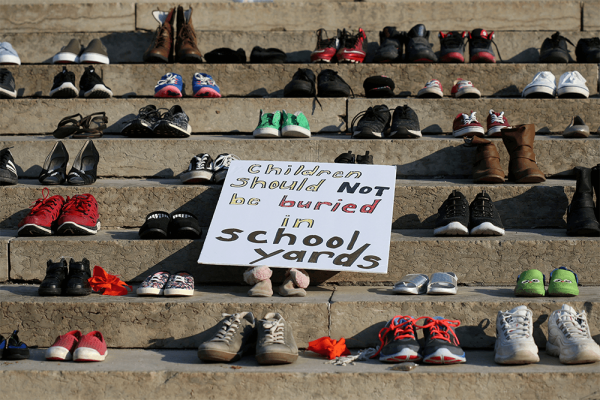In late May, the uncovering of a mass grave containing the remains of 215 children on the grounds of a former residential school in Kamloops, British Columbia, shook Canadians, and indeed, the world. One month later, 751 unmarked graves were located at a school outside Marieval, Saskatchewan. And we know these cases are just the beginning. Stories of mass graves have circulated for decades, both in Canada and the United States, and on June 22, U.S. Interior Secretary Deb Haaland announced an investigation into these institutions.
One example is the Carlisle Indian Industrial School in Pennsylvania, where at least 180 Indigenous children died before it closed in 1918. The school opened in 1879 under the direction of veteran Civil War Brigadier Gen. Richard Henry Pratt. Pratt was famous for saying that it was necessary to “kill the Indian, and save the man,” an ideology that was central to the operation and development of residential schools, where children were boarded as young as 3 years old. By 1902, there were 25 federally funded boarding schools in the United States, and by 1930, there were more than 80 operating in Canada, largely run by various Christian denominations. Off-reserve education of children quickly became mandatory; it wasn’t until 1978, when President Jimmy Carter signed the Indian Child Welfare Act, that Native American parents could legally refuse to send their children to U.S. boarding schools, although the schools continued to operate for years afterward.
Indigenous people knew the graves were there. Canada’s Truth and Reconciliation Commission, which ended in 2015, contained a large section on unmarked graves. Survivors in Canada and the United States talked about these mass graves, but people didn’t hear them, so when the graves were uncovered, people were shaken. But that level of emotional intensity is hard to maintain. The emotions the news elicits are painful — so after the speeches and the promises, equilibrium is restored and things go back to normal. Business as usual.
Christians who are part of the dominant culture often feel bad or guilty, but they don't know what to do; in that paralysis, they retreat to what they know: thoughts and prayers. They resolve to be better people without grappling with the structures in their society or the theology that allowed those injustices to occur in the first place. Equilibrium is maintained. While many white Christians may distance themselves from the overt racism of white supremacists, they neglect to consider that the world Christian nationalists are working toward is one in which they themselves will be safe. Boarding schools — along with the entire structure of our churches, government, policing, and military — combine to create a particular world. White Christians are safe in that world; by disavowing and distancing themselves from the Christian Right, they are neglecting their relationship to it.
We inherit our relationships, not only between individual family members but between social groups. My father is Ojibwe and my mother came here as a refugee from Eastern Europe after World War II. Through them I have inherited a set of relationships with the government, with Canadians, and with the church. These inheritances come with differing beliefs about those relationships, differing expressions of power and belonging. Relationships are responsibilities and so part of my work as an Indigenous person — and part of your work as a Christian — is to understand this history and the relationships it has created. Understanding how Christian beliefs, how business as usual, allowed the schools to exist will show you how you can respond to injustice today in ways that bring us all closer to a more just world.
Micah 6:8 tells us to act justly, love mercy, and walk humbly with our God. We often use this verse to call Christians out of their prayer closets and into the streets to demand justice. But how do we act justly and love mercy in these relationships we have inherited, these relationships of power that robbed children of their language, their families, and their lives? It’s tempting to disavow them, to insist that it wasn’t us who did it. But if we are a part of the church, these are the relationships that we have inherited.
My church carries the name of its town, named for an Indigenous tribe displaced for white settlers. In its windows is a light-skinned Jesus rendered in stained glass. We sing songs about not being slaves to fear while living on stolen land that was once worked by enslaved people. We sing other songs proclaiming that there are no outsiders, no borders to God’s love, near the well-guarded Canada-U.S. border. These are the relationships we have inherited.
How can Christians take hold of this moment to do something substantive and challenge business as usual?
It begins with listening to those who have been marginalized by our safety. It begins by noticing who is not at our podiums, on our bookshelves, or at the tables where decisions are being made — and then thinking about the barriers that keep them out and us safe. This learning leads us into the streets where we join with others to demand justice and mercy. It leads us into relationships with those our safety has excluded and harmed. It leads us out of metaphors and into action. We may feel uncomfortable, but we will not be unsafe and these are not the same thing.
Got something to say about what you're reading? We value your feedback!








